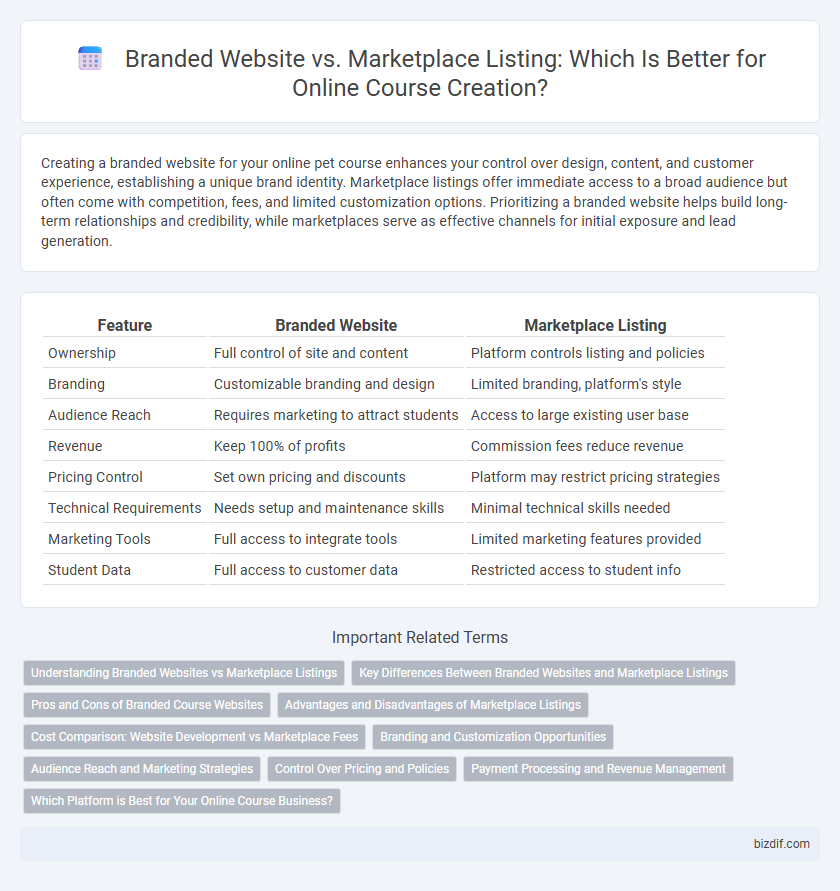Creating a branded website for your online pet course enhances your control over design, content, and customer experience, establishing a unique brand identity. Marketplace listings offer immediate access to a broad audience but often come with competition, fees, and limited customization options. Prioritizing a branded website helps build long-term relationships and credibility, while marketplaces serve as effective channels for initial exposure and lead generation.
Table of Comparison
| Feature | Branded Website | Marketplace Listing |
|---|---|---|
| Ownership | Full control of site and content | Platform controls listing and policies |
| Branding | Customizable branding and design | Limited branding, platform's style |
| Audience Reach | Requires marketing to attract students | Access to large existing user base |
| Revenue | Keep 100% of profits | Commission fees reduce revenue |
| Pricing Control | Set own pricing and discounts | Platform may restrict pricing strategies |
| Technical Requirements | Needs setup and maintenance skills | Minimal technical skills needed |
| Marketing Tools | Full access to integrate tools | Limited marketing features provided |
| Student Data | Full access to customer data | Restricted access to student info |
Understanding Branded Websites vs Marketplace Listings
Branded websites provide full control over course presentation, pricing, and customer data, enabling personalized marketing and stronger brand identity. Marketplace listings benefit from built-in traffic and established trust but often involve higher fees and limited customization options. Choosing between these platforms depends on prioritizing autonomy and brand differentiation versus immediate exposure and ease of access.
Key Differences Between Branded Websites and Marketplace Listings
Branded websites offer complete control over course presentation, pricing, and customer data, allowing for tailored branding and marketing strategies, whereas marketplace listings provide instant access to established audiences but with limited customization and higher competition. Revenue models differ significantly, with branded sites typically requiring upfront investment and offering full revenue retention, while marketplaces function on commission-based fees or revenue sharing. SEO advantages favor branded websites due to unique content and domain authority, while marketplaces benefit from built-in traffic but face challenges in differentiation.
Pros and Cons of Branded Course Websites
Branded course websites offer complete control over design, branding, and user experience, enabling personalized marketing strategies and direct customer relationships that boost long-term engagement. However, they require higher upfront investment in development, ongoing maintenance costs, and greater effort in driving traffic compared to marketplace listings with built-in audiences. The ability to retain full revenue and customer data often outweighs challenges of lower initial visibility and technical complexity.
Advantages and Disadvantages of Marketplace Listings
Marketplace listings provide instant access to large, engaged audiences on platforms such as Udemy or Coursera, increasing course visibility without the need for extensive marketing efforts. However, these platforms often impose revenue-sharing models and limited pricing control, which can reduce overall profitability compared to branded websites. Additionally, marketplace listings restrict branding opportunities and customization, potentially diluting the course creator's unique identity and limiting long-term customer relationship building.
Cost Comparison: Website Development vs Marketplace Fees
Creating a branded website for online courses involves upfront costs such as domain registration, web hosting, and platform subscriptions, which can range from $100 to $500 annually depending on features and traffic. Marketplace listings typically charge transaction fees between 20% to 40% per sale, which can accumulate significantly with high enrollment but require minimal initial investment. Over time, a branded website can be more cost-effective for scaling course sales by eliminating recurring marketplace fees.
Branding and Customization Opportunities
Branded websites offer extensive customization opportunities, allowing course creators to design unique layouts, use personalized branding elements such as logos and color schemes, and control the user experience, enhancing brand recognition and trust. In contrast, marketplace listings provide limited customization options, typically confined to preset templates that prioritize uniformity over individual brand identity. This distinction significantly impacts how effectively educators can establish their brand presence and differentiate their courses in a competitive online learning environment.
Audience Reach and Marketing Strategies
Branded websites offer full control over audience targeting and personalized marketing strategies, enabling creators to build long-term relationships and optimize for SEO to attract organic traffic. Marketplace listings provide instant access to a large, established audience, leveraging platform-specific promotional tools but at the cost of higher competition and limited brand differentiation. Strategic use of email marketing and social media integration on a branded site enhances audience retention, whereas marketplaces rely heavily on platform-driven discovery and paid ads for visibility.
Control Over Pricing and Policies
Creating a branded website grants complete control over pricing strategies and refund policies, allowing course creators to tailor offers and promotions directly to their target audience. Marketplace listings often impose fixed pricing tiers and standardized terms, limiting customization and flexibility in revenue management. Mastery over pricing and policies through a branded platform enhances brand identity and maximizes profit margins.
Payment Processing and Revenue Management
Branded websites offer complete control over payment processing and revenue management, enabling course creators to set pricing, manage subscriptions, and retain a higher percentage of earnings without platform fees. Marketplace listings typically handle payment processing on behalf of creators but deduct commissions and limit customization in pricing strategies, impacting overall revenue. Prioritizing a branded website allows seamless integration with payment gateways like Stripe or PayPal, enhancing cash flow transparency and maximizing profit margins.
Which Platform is Best for Your Online Course Business?
Choosing between a branded website and a marketplace listing depends on your goals, audience control, and revenue preferences for your online course business. A branded website offers full customization, brand autonomy, and direct customer relationships, while marketplaces provide instant access to large audiences and simplified marketing but with higher competition and commission fees. Evaluate factors such as long-term scalability, marketing control, and profit margins to determine the optimal platform for maximizing course sales and business growth.
Branded website vs Marketplace listing Infographic

 bizdif.com
bizdif.com